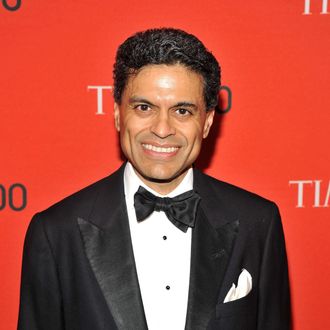
Briefly suspended Time columnist/CNN host/Washington Post writer Fareed Zakaria completed the media scandal repentance cycle today by giving an interview to the New York Times. Zakaria’s lifting of a passage from The New Yorker was determined by his employers to be an “isolated incident,” and he’ll return to most of his myriad jobs after the wrist slap, but the Times’ forgiving assessment attempts to address the how and why. By way of explanation, Zakaria went with the old “handwritten notes” line, while those around him gently suggested he may have spread himself too thin because of the changing times.
The Times reports:
The mistake, [Zakaria] said, occurred when he confused the notes he had taken about Ms. Lepore’s article — he said he often writes his research in longhand — with notes taken from “Gunfight: The Battle Over the Right to Bear Arms in America,” by Adam Winkler (W.W. Norton, 2011), a copy of which was on his desk at his CNN office.
As The Atlantic Wire notes, we’ve heard variations of that one before. Here’s David Plotz writing in 2002:
No matter what they steal, they fall back on the same excuses, as Thomas Mallon shows in his wonderful plagiarism book Stolen Words. Before the computer age, they blamed their confusing “notebooks,” where they allegedly mixed up their own notes with passages recorded elsewhere. These days, plagiarists claim they mistake electronic files of notes with their own writing.
In a more abstract sense, Zakaria just has a lot on his plate due to the hustling required to really thrive in this media landscape. “This guy is his own brand,” said former Time editor Jim Kelly. “So when doing that, you have to be really careful at how you extend yourself. The American corporate landscape is littered with disastrous brand extensions.” As one journalism expert explained, “What happens in the media is the cult of personality … The brands who have been forced to cut their staff have been forced to take on the brands of journalists.”
Which brings us — thanks in part to the proximity of their screwups — to Jonah Lehrer, the fresh-faced New Yorker staffer and pop-science speaker who resigned for copying his own work and fabricating quotes. As Kelly wrote for Vanity Fair last week, Zakaria and Lehrer “are not so much journalists as brands … The news shows on TV love journalists whose credibility is rooted in print, the book industry loves journalists who can appear on TV, the print world loves journalists who can appear on TV and write books, the lecture circuit loves speakers who are journalists who appear on TV and … well, you get the point.”
David Carr has a similar take, also in the Times today, where he lays more blame on Lehrer than Zakaria, but admits, “Both are overhyphenated in a way that makes feeding all those platforms with fresh intellectual scoops a risky enterprise…”
To show he’s learned a little lesson, Zakaria will cut a few of those money-making and hobnobbing hyphens, telling the Times “he plans to cut back work with groups like the Council on Foreign Relations, the Little Shakespeare Company and the Yale University governing board. He also says he plans to make fewer speeches.” But something tells us he’ll get by.





























